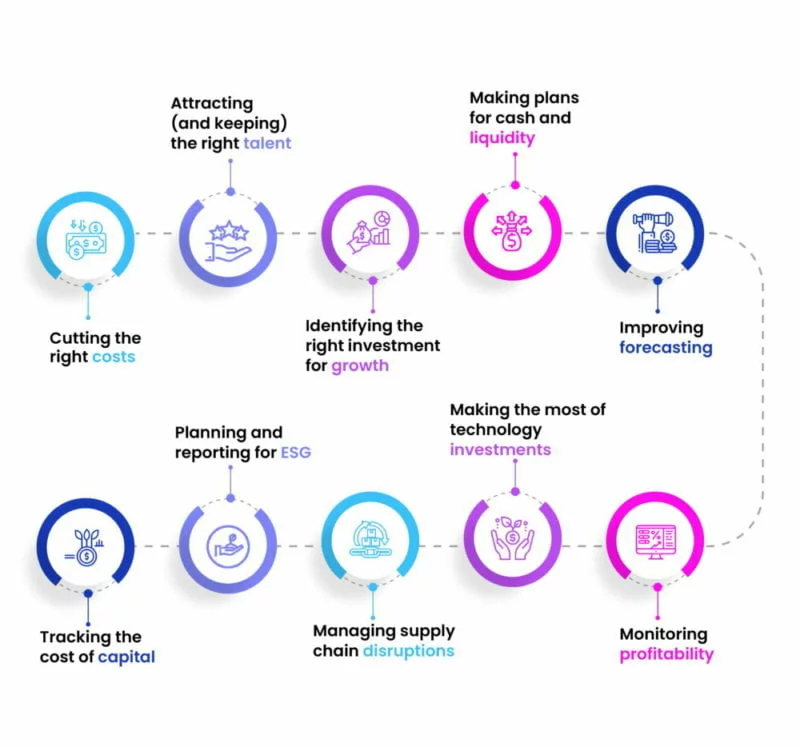Emerging Trends and Priorities for CFOs in 2023-2024: A Comprehensive Guide

In the ever-evolving landscape of finance, Chief Financial Officers (CFOs) face a multitude of challenges and opportunities in their quest to drive growth and enhance organizational performance. As we step into 2023-2024, it becomes crucial for CFOs to stay ahead of the curve by embracing emerging trends and understanding the shifting priorities that will shape the financial landscape.
This comprehensive guide dives deep into the emerging trends and priorities that CFOs should focus on to navigate the complex terrain of modern finance successfully. From advancements in technology and data analytics to evolving regulatory landscapes and changing stakeholder expectations, this blog equips CFOs with the knowledge and strategies needed to thrive in the year ahead.
Technology and Automation
Technology empowers CFOs with data-driven insights that were previously inaccessible or time-consuming to obtain. With the vast amount of financial and non-financial data available, AI and ML algorithms can analyze patterns, detect anomalies, and generate actionable insights to support decision-making. CFOs can leverage these insights to identify cost-saving opportunities, optimize resource allocation, and mitigate risks effectively. By embracing technology-driven data analytics, CFOs can make informed and data-backed decisions that drive financial performance and create a competitive edge.
As per a recent CFO survey on accelerating enterprise transformation, 53% of CFOs say they plan to focus on digital transformation using data analytics, AI, automation, and cloud solutions.
Cloud-based platforms and digital tools facilitate real-time access to financial data, allowing CFOs to collaborate seamlessly with stakeholders across departments, locations, and even different time zones. This promotes transparency, efficiency, and cross-functional alignment, leading to more effective decision-making and resource optimization.
NetSuite’s embedded analytics solution revolutionizes the way businesses harness their data for actionable insights and improved decision-making. By seamlessly integrating business intelligence into every department, NetSuite eliminates the gap between data analysis and business outcomes, all without adding extra workflow burdens. With its unified platform, powerful APIs, and real-time business intelligence, NetSuite empowers organizations to gain a comprehensive understanding of their data’s business context. This enables them to uncover hidden information, make critical business decisions, and drive success across departments, teams, and subsidiaries. Whether it’s sales, marketing, finance, or operations, NetSuite’s embedded analytics solution provides a centralized hub for discovering valuable insights that translate into tangible results. Say goodbye to disjointed data analysis and hello to a unified approach that delivers actionable business analysis to every corner of your organization.
NetSuite for CFOs offers a comprehensive suite of technology solutions designed to address the specific needs of finance leaders. Their AI-powered modules automate financial processes, provide real-time visibility into financial data, and deliver robust analytics capabilities. With NetSuite’s technology stack, CFOs can achieve greater efficiency, accuracy, and agility in their financial operations.
Regulatory Compliance and Risk Mitigation
In the rapidly changing business environment of 2023, CFOs face an array of regulatory challenges that demand their attention. Effectively managing compliance and mitigating risks have become pivotal tasks for finance leaders to protect their organizations and maintain stakeholder trust. This practical guide offers CFOs actionable strategies to navigate the evolving regulatory landscape and implement robust compliance frameworks.
Conducting a comprehensive risk assessment is another vital step. CFOs should collaborate with legal counsel, risk management teams, and business unit leaders to identify and prioritize key risks associated with their industry, business operations, and financial processes. This comprehensive assessment serves as the foundation for developing a robust compliance framework tailored to the organization’s specific regulatory requirements.
Technology plays a pivotal role in effective compliance and risk management. CFOs can leverage integrated ERP systems like NetSuite to centralize financial data, automate compliance processes, and ensure accurate and timely reporting. Investing in training and education programs is also essential. By providing ongoing training and awareness sessions, CFOs can enhance employees’ understanding of regulatory requirements and their responsibilities in compliance and risk management. Regular workshops and webinars keep the workforce up to date on evolving regulations, best practices, and potential risks.
Engaging external experts, such as legal counsel and consultants with regulatory expertise, can provide valuable insights and ensure compliance efforts align with the latest requirements. These experts offer guidance and assistance in interpreting complex regulations and provide strategic advice on compliance strategies.
Continuously monitoring and updating compliance efforts is crucial in the ever-evolving regulatory landscape. CFOs should establish processes for regular reviews and updates of policies, procedures, and controls to adapt to new regulations and emerging risks. Internal audits and assessments help identify areas for improvement and allow for proactive measures to address compliance gaps.
Strategic Financial Planning
CFOs face the challenge of creating accurate budgets and forecasts that reflect the organization’s goals and align with market realities. This requires a deep understanding of financial data, industry trends, and internal business dynamics. CFOs should leverage advanced financial management systems, such as NetSuite, to integrate budgeting and forecasting processes, streamline data collection, and enable real-time analysis for more accurate projections.
Financial planning involves assessing current financial health, setting goals, and developing strategies to achieve them. CFOs must grapple with various complexities, including market volatility, changing customer demands, and regulatory uncertainties. These factors create a dynamic environment that requires CFOs to adopt flexible and agile financial planning approaches.
As per a recent CFO survey on enabling enterprise growth, 68% of CFOs say they’re confident they can achieve near-term growth goals.
Scenario analysis is a critical tool for CFOs to assess the potential impact of various scenarios on their organization’s financial performance. CFOs must consider multiple scenarios, such as economic downturns, industry disruptions, or regulatory changes, and evaluate their effects on revenue, expenses, and cash flow. By conducting robust scenario analyses, CFOs can identify risks, develop contingency plans, and proactively mitigate potential financial challenges.
As per a recent survey on navigating economic uncertainties, 47% of CFOs say their top priority is building predictive models and scenario analysis capabilities.
Key challenges faced by the CFOs in 2023

Close the technology gap with ERP
In 2023, modern ERP software solutions are specifically designed to meet the toughest challenges faced by CFOs, covering the entire back office. These solutions provide robust financial management capabilities and bridge the technology gap
Key features of these software solutions include:
Comprehensive View: CFOs can access a holistic view of accounting, financial planning, operational planning, supply chain, and procurement. This allows them to work closely with other C-suite leaders to identify cost-cutting opportunities while maintaining sufficient capital for investment and growth.
Consistent and Real-time Data: Modern ERP systems offer consistent and reliable data, processed in real-time. This enables CFOs and their teams to deliver accurate and timely information for strategic decision-making.
Powerful Analytics: The software provides powerful analytics tools that help CFOs analyze data effectively. These tools enable them to derive valuable insights, identify trends, and make data-driven decisions.
Cloud-based Flexibility: Cloud ERP software, such as Oracle’s solution, supports frequent planning and forecasting cycles. This agility allows companies to adapt their strategies quickly in response to changing macro conditions.
Amzur services for the CFOs
Amzur has a proven track record of successfully delivering over 200+ NetSuite implementation projects in the last two decades, specializing in industries such as Manufacturing, Retail, E-commerce, Wholesale & Distribution, and Food & Beverages. By leveraging their expertise and experience, Amzur helps these industries automate their workflows, resulting in a remarkable 70% reduction in the time taken to generate invoices. Moreover, they provide enhanced financial reporting analysis, catering specifically to the needs of CFOs. With over 15+ years of industry knowledge, Amzur empowers its customers by offering solutions like real-time dashboards and indicators. These tools enable businesses & CFOs to proactively identify projects that are at risk of exceeding their budget, allowing for better risk management and mitigation strategies well in advance.

Director – ERP Advisory & NetSuite Solutions




